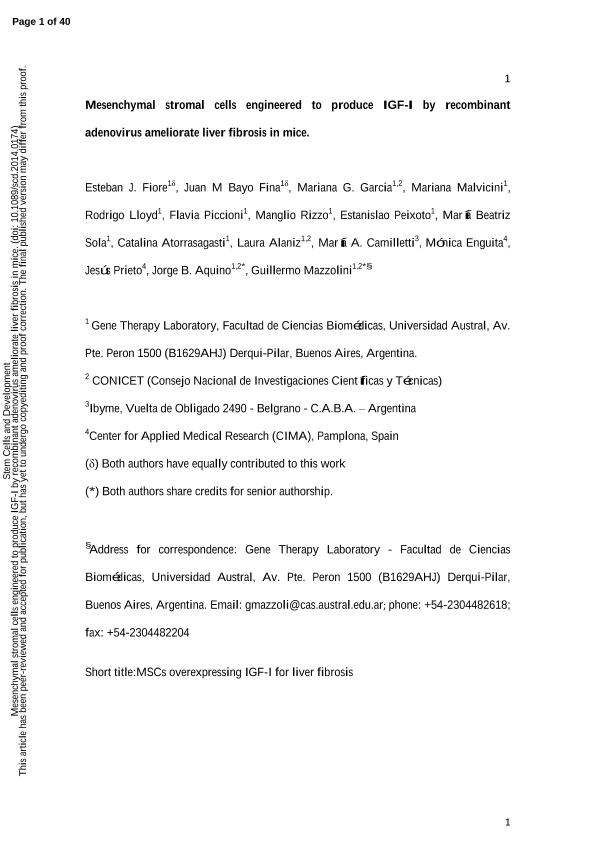Artículo
Mesenchymal stromal cells engineered to produce IGF-I by recombinant adenovirus ameliorate liver fibrosis in mice
Fiore, Esteban Juan ; Bayo Fina, Juan Miguel
; Bayo Fina, Juan Miguel ; García, Mariana Gabriela
; García, Mariana Gabriela ; Malvicini, Mariana
; Malvicini, Mariana ; Lloyd, Rodrigo; Piccioni, Flavia Valeria
; Lloyd, Rodrigo; Piccioni, Flavia Valeria ; Rizzo, Manglio Miguel
; Rizzo, Manglio Miguel ; Peixoto, Estanislao
; Peixoto, Estanislao ; Sola, M. Beatriz; Atorrasagasti, María Catalina
; Sola, M. Beatriz; Atorrasagasti, María Catalina ; Alaniz, Laura Daniela
; Alaniz, Laura Daniela ; Camilletti, María Andrea
; Camilletti, María Andrea ; Enguita, Mónica; Prieto, Jesús; Aquino, Jorge Benjamin
; Enguita, Mónica; Prieto, Jesús; Aquino, Jorge Benjamin ; Mazzolini Rizzo, Guillermo Daniel
; Mazzolini Rizzo, Guillermo Daniel
 ; Bayo Fina, Juan Miguel
; Bayo Fina, Juan Miguel ; García, Mariana Gabriela
; García, Mariana Gabriela ; Malvicini, Mariana
; Malvicini, Mariana ; Lloyd, Rodrigo; Piccioni, Flavia Valeria
; Lloyd, Rodrigo; Piccioni, Flavia Valeria ; Rizzo, Manglio Miguel
; Rizzo, Manglio Miguel ; Peixoto, Estanislao
; Peixoto, Estanislao ; Sola, M. Beatriz; Atorrasagasti, María Catalina
; Sola, M. Beatriz; Atorrasagasti, María Catalina ; Alaniz, Laura Daniela
; Alaniz, Laura Daniela ; Camilletti, María Andrea
; Camilletti, María Andrea ; Enguita, Mónica; Prieto, Jesús; Aquino, Jorge Benjamin
; Enguita, Mónica; Prieto, Jesús; Aquino, Jorge Benjamin ; Mazzolini Rizzo, Guillermo Daniel
; Mazzolini Rizzo, Guillermo Daniel
Fecha de publicación:
12/2014
Editorial:
Mary Ann Liebert
Revista:
Stem Cells And Development
ISSN:
1547-3287
Idioma:
Inglés
Tipo de recurso:
Artículo publicado
Clasificación temática:
Resumen
Liver cirrhosis involves chronic wound healing and fibrotic processes. Mesenchymal stromal cells (MSCs) are multipotent adult progenitor cells that are used as vehicles of therapeutic genes. Insulin growth factor like-I (IGF-I) was shown to counteract liver fibrosis. We aimed at analyzing the effect of applying IGF-I overexpressing mouse bone marrow-derived MSCs on hepatic fibrosis. Fibrosis was induced by chronic thioacetamide application or bile duct ligation. MSCs engineered to produce green fluorescent protein (GFP) (AdGFP-MSCs) or IGF-I (AdIGF-I-MSCs) were applied systemically, and changes in collagen deposition and in the expression of key pro-fibrogenic and pro-regenerative genes/proteins were assessed. In addition, immunogenicity of transduced cells was analyzed. Liver fibrosis was further ameliorated after a single-dose application of AdIGF-I-MSCs when compared with AdGFP-MSCs and/or recombinant IGF-I treatments. Interestingly, an early and transitory upregulation in IGF-I and hepatocyte growth factor (HGF) mRNA expression was found in the liver of MSC-treated animals, which was more pronounced in AdIGF-I-MSCs condition. A reduction in hepatic stellate cell activation status was found after incubation with MSCs conditioned media. In addition, the AdIGF-I-MSCs cell-free supernatant induced the expression of IGF-I and HGF in primary cultured hepatocytes. From day 1 after transplantation, the proliferation marker proliferating cell nuclear antigen was upregulated in the liver of AdIGF-I-MSCs group, mainly in hepatocytes. MSCs were in vivo traced till day 14 after injection. In addition, multiple doses of Ad-IGF-I-MSCs likely suppressed antiviral immune response and it further reduced collagen deposition. Our results uncover early events that are likely involved in the anti-fibrogenic effect of genetically modified MSCs and overall would support the use of AdIGF-I-MSCs in treatment of liver fibrosis.
Archivos asociados
Licencia
Identificadores
Colecciones
Articulos(IBYME)
Articulos de INST.DE BIOLOGIA Y MEDICINA EXPERIMENTAL (I)
Articulos de INST.DE BIOLOGIA Y MEDICINA EXPERIMENTAL (I)
Articulos(SEDE CENTRAL)
Articulos de SEDE CENTRAL
Articulos de SEDE CENTRAL
Citación
Fiore, Esteban Juan; Bayo Fina, Juan Miguel; García, Mariana Gabriela; Malvicini, Mariana; Lloyd, Rodrigo; et al.; Mesenchymal stromal cells engineered to produce IGF-I by recombinant adenovirus ameliorate liver fibrosis in mice; Mary Ann Liebert; Stem Cells And Development; 24; 6; 12-2014; 791-801
Compartir
Altmétricas



